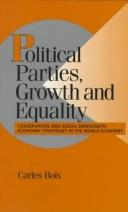| Listing 1 - 10 of 11 | << page >> |
Sort by
|
Book
ISBN: 9781107461079 9781107089433 9781316105504 1107089433 1107461073 1316105504 1316289524 1316310183 Year: 2015 Publisher: Cambridge : Cambridge University Press,
Abstract | Keywords | Export | Availability | Bookmark
 Loading...
Loading...Choose an application
- Reference Manager
- EndNote
- RefWorks (Direct export to RefWorks)
The fundamental question of political theory, one that precedes all other questions about the nature of political life, is why there is a state at all. Is human cooperation feasible without a political authority enforcing it? Or do we need a state to live together? This problem then opens up two further questions. If a state is necessary to establish order, how does it come into place? And, when it does, what are the consequences for the political status and economic welfare of its citizens? Combining ethnographical material, historical cases, and statistical analysis, this book describes the foundations of stateless societies, why and how states emerge, and the basis of political obligation. As a result of this inquiry, it explains the economic and political roots of inequality, describes the causes of the stagnation of the preindustrial world, and explores what led to the West's prosperity of the past two centuries.
State, The --- Common good --- Equality --- Etat --- Bien commun --- Egalité (Sociologie) --- Egalité (Sociologie) --- State, The. --- Common good. --- Equality.

ISBN: 0521585953 0521584469 1139174940 Year: 1998 Publisher: Cambridge : Cambridge University Press,
Abstract | Keywords | Export | Availability | Bookmark
 Loading...
Loading...Choose an application
- Reference Manager
- EndNote
- RefWorks (Direct export to RefWorks)
Given the increased openness of countries to international trade and financial flows, the general public and the scholarly literature have grown skeptical about the capacity of policy-makers to affect economic performance. Challenging this view, Political Parties, Growth, and Equality shows that the increasingly interdependent world economy and recent technological shocks have actually exacerbated the dilemmas faced by governments in choosing among various policy objectives, such as generating jobs and reducing income inequality, thereby granting political parties and electoral politics a fundamental and growing role in the economy. To make growth and equality compatible, social democrats employ the public sector to raise the productivity of capital and labor. By contrast, conservatives rely on the private provision of investment. Based on analysis of the economic policies of all OECD countries since the 1960s and in-depth examination of Britain and Spain in the 1980s, this book offers a new understanding of how contemporary democracies work.
Political parties --- Economic policy --- Economic nationalism --- Economic planning --- National planning --- State planning --- Economics --- Planning --- National security --- Social policy --- Parties, Political --- Party systems, Political --- Political party systems --- Political science --- Divided government --- Intra-party disagreements (Political parties) --- Political conventions --- Economic policy. --- Political parties. --- Social Sciences --- Political Science

ISBN: 9780521532679 9780521825603 0521825601 0521532671 9780511804960 1316283135 0511804962 Year: 2003 Publisher: Cambridge : Cambridge University Press,
Abstract | Keywords | Export | Availability | Bookmark
 Loading...
Loading...Choose an application
- Reference Manager
- EndNote
- RefWorks (Direct export to RefWorks)
When do countries democratize? What facilitates the survival of authoritarian regimes? What determines the occurrence of revolutions, often leading to left-wing dictatorships, such as the Soviet regime? Although a large literature has developed since Aristotle through contemporary political science to answer these questions, we still lack a convincing understanding of the process of political development. Employing analytical tools borrowed from game theory, Carles Boix offers a complete theory of political transitions, in which political regimes ultimately hinge on the nature of economic assets, their distribution among individuals, and the balance of power among different social groups. Backed up by detailed historical work and extensive statistical analysis that goes back to the mid-nineteenth century, this 2003 book explains why democracy emerged in classical Athens. It also discusses the early triumph of democracy in both nineteenth-century agrarian Norway, Switzerland and northeastern America and the failure in countries with a powerful landowning class.
Sociological theory building --- Political systems --- Development, Political --- Political development. --- Democratization --- Political development --- Economic development --- Democratization. --- Economic development. --- #SBIB:041.AANKOOP --- #SBIB:324H71 --- Development, Economic --- Economic growth --- Growth, Economic --- Democratic consolidation --- Democratic transition --- Politieke verandering: modernisatie, democratisering, regional development --- Economic policy --- Economics --- Statics and dynamics (Social sciences) --- Development economics --- Resource curse --- Political science --- New democracies
Book
ISBN: 9780691191843 Year: 2019 Publisher: Princeton, NJ
Abstract | Keywords | Export | Availability | Bookmark
 Loading...
Loading...Choose an application
- Reference Manager
- EndNote
- RefWorks (Direct export to RefWorks)
No detailed description available for "Democratic Capitalism at the Crossroads".
Book
ISBN: 0691191840 Year: 2019 Publisher: Princeton, NJ : Princeton University Press,
Abstract | Keywords | Export | Availability | Bookmark
 Loading...
Loading...Choose an application
- Reference Manager
- EndNote
- RefWorks (Direct export to RefWorks)
An incisive history of the changing relationship between democracy and capitalismThe twentieth century witnessed the triumph of democratic capitalism in the industrialized West, with widespread popular support for both free markets and representative elections. Today, that political consensus appears to be breaking down, disrupted by polarization and income inequality, widespread dissatisfaction with democratic institutions, and insurgent populism. Tracing the history of democratic capitalism over the past two centuries, Carles Boix explains how we got here-and where we could be headed.Boix looks at three defining stages of capitalism, each originating in a distinct time and place with its unique political challenges, structure of production and employment, and relationship with democracy. He begins in nineteenth-century Manchester, where factory owners employed unskilled laborers at low wages, generating rampant inequality and a restrictive electoral franchise. He then moves to Detroit in the early 1900s, where the invention of the modern assembly line shifted labor demand to skilled blue-collar workers. Boix shows how growing wages, declining inequality, and an expanding middle class enabled democratic capitalism to flourish. Today, however, the information revolution that began in Silicon Valley in the 1970s is benefitting the highly educated at the expense of the traditional working class, jobs are going offshore, and inequality has risen sharply, making many wonder whether democracy and capitalism are still compatible.Essential reading for these uncertain times, Democratic Capitalism at the Crossroads proposes sensible policy solutions that can help harness the unruly forces of capitalism to preserve democracy and meet the challenges that lie ahead.
Technological innovations --- Capitalism --- Economic aspects. --- Political aspects.
Book
Year: 2009 Publisher: Barcelona CIDOB
Abstract | Keywords | Export | Availability | Bookmark
 Loading...
Loading...Choose an application
- Reference Manager
- EndNote
- RefWorks (Direct export to RefWorks)
Book
Year: 1998 Publisher: New York Cambridge Melbourne Cambridge University Press
Abstract | Keywords | Export | Availability | Bookmark
 Loading...
Loading...Choose an application
- Reference Manager
- EndNote
- RefWorks (Direct export to RefWorks)

ISBN: 9780199278480 9780199566020 0199278482 019956602X Year: 2007 Publisher: Oxford ; New York : Oxford University Press,
Abstract | Keywords | Export | Availability | Bookmark
 Loading...
Loading...Choose an application
- Reference Manager
- EndNote
- RefWorks (Direct export to RefWorks)
Politics --- Comparative government. --- Institutions politiques comparées --- Comparative government --- #SBIB:32H3 --- #SBIB:324H20 --- Politieke wetenschappen: inleidende werken, handboeken, methoden --- Politologie: theorieën (democratie, comparatieve studieën….) --- Institutions politiques comparées --- staatswetenschappen --- staatstheorie --- Comparative political systems --- Comparative politics --- Government, Comparative --- Political systems, Comparative --- Political science --- maatschappijwetenschappen, methoden --- politiek, internationaal --- conflict
Book
ISBN: 9780191577482 Year: 2009 Publisher: Oxford Oxford University Press
Abstract | Keywords | Export | Availability | Bookmark
 Loading...
Loading...Choose an application
- Reference Manager
- EndNote
- RefWorks (Direct export to RefWorks)
Book
Year: 2017 Publisher: Washington, D.C. : The World Bank,
Abstract | Keywords | Export | Availability | Bookmark
 Loading...
Loading...Choose an application
- Reference Manager
- EndNote
- RefWorks (Direct export to RefWorks)
Here I explore the process leading to the formation of the state in two steps. In the first part of this research note, I examine the transition from stateless to state societies, that is, I characterize the conditions under which the state arises. In the second part, I analyze the consolidation of the state, that is, the conditions under which, once it has been established, the state remains in place and avoids falling back into what many have referred to as a "failed state". In both parts I proceed in the same fashion. After presenting a "minimalist" or bare-bones theory, I briefly discuss the extent to which our empirical evidence seems to match the main insights of the theory.
| Listing 1 - 10 of 11 | << page >> |
Sort by
|

 Search
Search Feedback
Feedback About UniCat
About UniCat  Help
Help News
News